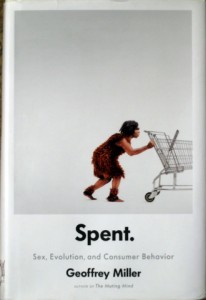I’ve repeatedly written about Geoffrey Miller based on the many provocative ideas presented in his earlier book, The Mating Mind. (e.g., see my earlier post, “Killer High Heels“). A gifted and entertaining writer, Miller is also an evolutionary psychologist. His forte is hauling his scientific theories out into the real world in order to persuade us that we didn’t really understand some of the things that seemed most familiar to us.

In his new book, Spent, Miller asks why we continuously buy all that stuff that we don’t really need? Miller’s answer is twofold. Yes, human animals have been physically and psychologically honed over the eons this to crave certain types of things over others to further their chances at survival and reproduction. That’s only half the answer, however. We must also consider “marketing,” which is
The most important invention of the past two millennia because it is the only revolution that has ever succeeded in bringing real economic power to the people. . . . it is the power to make our means of production transform the natural world into a playground for human passions.
Is the modern version of marketing a good thing or a bad thing? The answer is yes.
On the upside it promises a golden age in which social institutions and markets are systematically organized on the basis of strong purple research to maximize human happiness. What science did for perception, marketing promises to do for production: it tests intuition and insight against empirical fact area market research uses mostly the same empirical tools as experimental psychology, but with larger research budgets, better-defined questions, more representative samples of people, and more social impact.
Here is a July 2009 interview of Geoffrey Miller by Geraldyne Doogue of the Australian Broadcast Network:
Most of us are quite familiar with the downside of marketing. It encourages us to buy things we don’t really need. But marketing doesn’t merely clutter up our houses and garages; it corrupts our souls:
On the downside, marketing is the Buddha’s worst nightmare. Is the grand illusion, the Veil of Maya, turned pseudoscientific and backed by billion-dollar advertising campaigns. It perpetuates the delusion that desire leads to fulfillment. It is the enemy of mindfull human consciousness, because consciousness is content with its own company, and needs little from the world.
Yes, we might think. Marketing leads to hyper-materialism. It causes us to buy all kinds of unneeded commodities. But this is where we doubly go astray. Miller explains that marketing is not about materialism and it is not about commodities. These are critical distinctions that we must learn to make:
The trouble is not that marketing promotes materialism. Quite the opposite it promotes a narcissistic pseudo-spiritualism based on subjective pleasure, social status, romance, and lifestyle, as a product’s mantle and associations become more important than its actual physical qualities. This is the whole point of advertising and branding–to create associations between a product and the aspirations of the consumer, so the product seems to be worth more to the consumer than its mere physical form could possibly warrant. Marketing actually avoids materialism at all costs, for if consumers comparison-shop solely on the basis of objective material features and costs, the products themselves will be reduced to commodities–and commodities cannot be sold for serious profits in a competitive market.
Miller raises the example of water, which costs less than a penny per gallon, whereas many designer waters cost more than five dollars per gallon. One brand does this with the help of “the image of a nearly nude Jennifer Aniston” on its advertisements.
Where will we eventually end up if we allow marketing to run amok? Not into any sort of commodified or materialistic world. Instead,
marketing’s logical culmination would not be crass materialism, but the seductive immaterialism of “The Matrix” or “Second Life.”
Every page of Spent challenges readers to rethink their most basic assumptions. For instance, on page 44, Miller argues that mass marketing “forces cultural elites to confront their patronizing attitudes toward the masses” and has serious ramifications for the way we see our government. in fact, Miller urges that democracy is “marketing applied to politics,” which highlights the issue of the extent to which common folks “can be trusted to understand their true long-term interests” and the role played by the enlightened minority with regard to controlling “the ignorant majority for the common good.”
The backdrop for this discussion is the rapaciousness of unchecked marketing:
Ecologists estimate that humans now consume more than half our planet’s “net primary productivity”-more than half the biomass grown each year on earth. One lucky species, out of 20 million, sucks up half of the biosphere’s annual output, and transforms it into work rules and leisure activities that are structured mainly by marketing.
I’m not yet halfway through Spent, but it is already a book that I am finding deeply transformative, even though I have already spent considerable time grappling with consumerist issues, such as the following posts. I highly recommend Geoffrey Miller’s Spent.
Related posts at Dangerous Intersection:
Shopping for Sex: wasteful consumerism and Darwin’s theory of sexual selection
What we buy versus what makes us happy.
The Grinch was much more evil than we thought.
We are drowning in material goods, yet we crave ever more stuff.
Churches: Places where rich people go to get God’s approval to live lavishly
and
Does constant exposure to advertising screw up our heads and lives?


Double display product:
"So, here's the worst idea I've heard all week: Lip gloss that lets everyone around you know you're horny. 'The saucy slap changes from clear to deep crimson as the wearer feels frisky,' reports The Sun. 'It works by reacting with a girl's body chemistry. And each £12 tube comes with a colour chart so men can work out how randy their partner is feeling.'"
http://www.independent.co.uk/opinion/commentators…